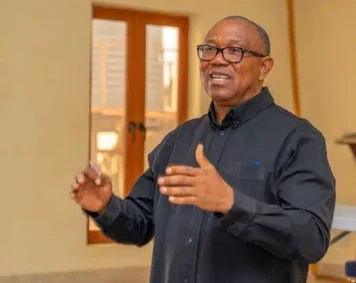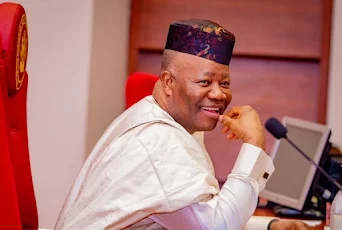skymediaconsults.blogspot.com
Saturday, December 30, 2023
Anambra pensioners beg Soludo to pay N850m arrears.
Obaseki signs six executive orders on investments.
Gov Abiodun rewards workers.
Gov Abiodun rewards workers.
The Ogun State Government has rewarded some workers in the state civil service for their outstanding performances towards the growth of the state in 2023.
Governor Dapo Abiodun, who was represented by the Head of Service, Kolawole Fagbohum, said the rewards given to the individuals were meant to encourage effective and healthy competition among the state workforce to improve their performances for the continuous growth of the state.
Abiodun stated this during the end-of-the-year thanksgiving and award of excellence organised by the Ministry of Environment in collaboration with other agencies, including Ogun State Environmental Protection Agency, and Ogun State Waste Management Authority, at the Government House in Abeokuta.
The awardees who received certificates and cash prizes were Olabamiji Akorede from the Ministry of Environment, Mrs Esther Adeyanju from Ogun State Environmental Protection Agency and Ibrahim Yusuf from Ogun State Waste Management Authority.
A statement on Saturday read in part, “Governor Abiodun also used the opportunity to reiterate government determination to always prioritise workers welfare which can be attested to by the monthly palliative allowance to cushion the effects of removal of fuel subsidy and global economic meltdown, payment of peculiar allowances and the recently paid end-of-the-year special bonus to all categories of its workforce.
“These allowances he said were effected without any labour unrest in the state which confirmed that the present administration is worker-friendly, pledging to always encourage them to always be the best they can be in the service through in-service training, upgrading and promotions.”
Obi laments declining reading culture among youths.
Elections should be decided at polling units, not courtrooms – Speaker.
Tinubu, Shettima’s Wives visit Akeredolu’s family in Ibadan.
Senate Passes 2024 Budget with Significant Increase of N1.2 Trillion.
Senate Passes 2024 Budget with Significant Increase of N1.2 Trillion.
In a significant development, the Nigerian Senate has passed the 2024 budget, marking a crucial step in the fiscal planning process for the upcoming year. The budget received approval during the third reading, accompanied by a substantial increase of N1.2 trillion, pushing the total appropriation from N27.5 trillion to N28.7 trillion.
The approval came following a voice vote led by Senate President Godswill Akpabio, indicating broad support for the revised budget. Before reaching this stage, the Senate diligently considered the report of the Appropriation Bill, initially presented by Senator Adeola Solomon, the Chairman of the Appropriation Committee.
Key highlights of the revised budget include the following allocations:
Aggregate Expenditure: N28,777,404,073,861
Statutory Transfers: N1,742,786,788,150
Recurrent Expenditure: N8,768,5330,852
Capital Expenditure: N9,995,143,298,028
GDP Growth Estimate: 3.88%
The initial budget proposal of N27.5 trillion was presented to a joint session of the National Assembly by President Bola Tinubu on November 29. Notably, the President had earmarked the budget deficit for the 2024 fiscal year at N9.18 trillion, representing 3.88% of Nigeria's gross domestic product (GDP).
President Tinubu explained that the deficit would be financed through various means, including new borrowings totaling N7.83 trillion, N298.49 billion from privatization proceeds, and a drawdown of 1.05 trillion naira on multilateral and bilateral loans secured for specific development projects.
The passage of the budget reflects the commitment of the Senate to expedite crucial fiscal matters for the benefit of the nation. It is anticipated that the revised budget will address evolving economic needs and contribute to Nigeria's growth and development.
The Senate had initially passed the budget for a second reading on December 1, setting the stage for detailed deliberations leading to the final approval during the third reading.
%20(28).jpeg)
.jpg)




